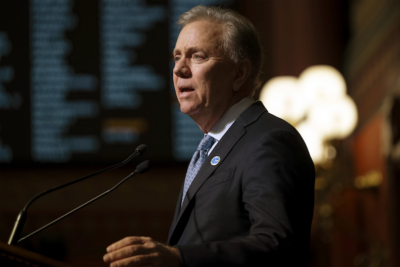
HARTFORD – If ever there was a reason to increase volatility cap of the fiscal guardrails, creating a Universal Preschool Endowment is certainly one, according to Gov. Ned Lamont.
In his speech in the Hall of the House of Representatives Wednesday, Feb. 5 the state’s Democratic governor unveiled his $55 billion fiscal year 2026 and 2027 biennium budget proposal. He stated that he wants to increase the cap threshold by $288.9 million in order to fund the endowment, which would be used to make sustainable investments in early care and education networks, decrease parents’ costs, and give children a head start on reading, math, and social skills.
“We have earned the opportunity to rethink the volatility threshold, which are tax revenues considered too unpredictable to spend on operating expenses, that can also create big deficits in the out years,” the governor said.
“In close coordination with Treasurer (Erick) Russell and Comptroller (Sean) Scanlon, I am proposing we move an additional 3% of revenue from our pension paydown into the General Fund, and any surplus, which is estimated at $300 million per year, be deposited in our brand-new Universal Preschool Endowment,” Lamont said.
“Three hundred million dollars from the fiscal ’25 surplus will seed the fund, and our budget anticipates almost $1 billion in the endowment over the next few years,” he continued. “We are building this endowment for the long term.
“With a 10% spend rate, our budget will have an additional $30 million next year, $60 million in ’27, all with the goal of providing pre-K and preschool spaces at no cost to families earning up to $100,000.”
The goal of the universal preschool endowment is to provide childcare at no cost to families making less than $100,000 a year and to implement a limited cost share for families making between $100,000-$150,000.
Funding early childhood care meets the criteria for lifting the volatility cap, according to House Speaker Matthew Ritter (D-Hartford).
“We’re creating an endowment for early pre-school education,” Ritter told CT-N. “He (Gov. Lamont) hit on a lot of themes that will play well on both sides of the aisle.
“The other reason to change the (fiscal) guardrails is to cut taxes. That’s what the Republicans said.”
The tax cut includes raising the property tax credit to $350 per homeowner, which would affect about 800,000 taxpayers who qualify, the governor said.
“We are trying to help our mayors and first selectmen hold the line on property taxes, which are high compared to our peers,” the governor said. “We have significantly increased municipal aid over these eight budgets, including investments that have more than doubled funding for PILOT (payment in lieu of taxes) grants. This budget further increases total municipal aid by $230 million over the biennium.”
Republican House Minority Leader Vincent Candelora (R-North Branford) speaking on the floor of the Hall of House of Representatives on Wednesday in front of the CT-N cameras said Lamont’s endowment proposal is a “money grab.”
“I think he went to the one area that is an easy fix for him,” Candelora said. “The volatility cap could be flexed. It shouldn’t be, though. He went there to grab money. It’s a money grab from our half-billion dollars in unfunded (pension fund) liabilities. We’re among the most indebted in the country” (in this area).
In his speech, Lamont mentioned that by year’s end the state should have paid down $10 billion in pension debt.
As for the overall budget for both years, Candelora believes there really isn’t anything in the spending plan for taxpayers.
“There’s nothing to fix energy costs, fix public safety. And he’s capping health care (costs) for physically disabled working people. At the same time, he’s not going to cap it for immigrants who come here illegally.”
Other areas the governor touched upon in his Feb. 5 budget speech included:
- Schools capital budget: “Our capital budget includes $500 million for new schools, our biggest increase in years. Just ask what those projects will mean to students in towns like Torrington, Trumbull, Thompson and New Britain. New schools will also include solar panels and insulation to reduce costs, and air conditioning and ventilation to keep us safe.”
- Quantum AI investment fund: “Connecticut Innovations, led by Matt McCooe, is announcing a $50 million quantum AI fund to invest in some of our most promising startups. Our budget increases the biotech research and development tax credit from 65% to 90%, and it eliminates the capital stock tax so startups with no profits can raise capital without getting taxed on it.”
- Medicaid rates: “Our Medicaid study highlighted specialties where Medicaid rates need some catching up, so our budget includes an additional $70 million for Medicaid rate increases. We have no idea how the feds will impact Medicaid costs, because the DOGE (Department of Government Efficiency) commission in Washington may root out fraud (and that’s good) or simply cost shift Medicaid expenses to the states (and that’s bad).”
- Housing: “We will continue our $400 million investment per year in housing – workforce, affordable, supportive, multi-family. People want to be in Connecticut, move to Connecticut, and the only thing slowing us down is a lack of housing.”
Last year that state built 70% more housing than just eight years ago with the help of its Time to Own program, which has aided more than 5,000 first-time homeowners buy their first home.



















